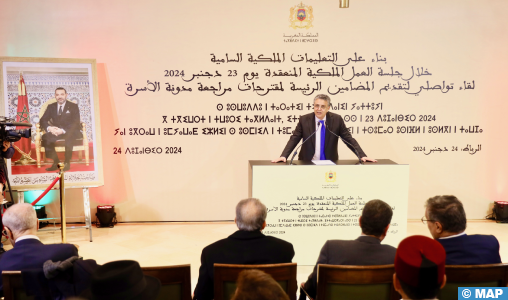
In a landmark development for Morocco’s legal and social landscape, Justice Minister Abdellatif Wehbi presented on Tuesday, December 24, 2024, in Rabat, a detailed outline of the substantial reforms proposed for the Family Code (Moudawana), following Monday’s historic working session chaired by King Mohammed VI at the Royal Palace in Casablanca.
The comprehensive reform package, featuring 139 amendments across seven books of the Code, represents the most significant update to Morocco’s family law since its groundbreaking 2004 revision. Among the most notable changes are:
- Setting the marriage age at 18 for both genders, with limited exceptions for 17-year-olds under strict conditions
- Establishing new controls on polygamy, including mandatory disclosure of the wife’s position on multiple marriages during the marriage contract
- Creating a non-judicial conciliation and mediation system for divorce cases
- Streamlining the divorce process by making consensual divorce a direct contract between spouses
- Protecting women’s rights by valuing domestic work as a contribution to marital property
- Maintaining maternal custody rights even after remarriage
- Introducing joint legal representation between spouses
- Opening the possibility of inheritance between spouses of different religions
- Implementing new protections for children’s rights and property
The reform process has been marked by extensive consultations involving political, civil society, and religious stakeholders. The Supreme Council of Ulema has provided religious legal opinions ensuring the changes align with Islamic principles while meeting contemporary needs.
A significant innovation is the establishment of a permanent framework within the Supreme Council of Ulema for ongoing Islamic legal interpretation (Ijtihad) on family matters, ensuring religious scholarship can continuously address emerging social issues.
The reform also includes practical implementation measures such as:
- Creating a single window system in family courts
- Establishing a national marriage and divorce registry
- Providing specialized training for family court judges
- Developing awareness programs for couples before marriage
- Modernizing court procedures and documentation
Head of Government Aziz Akhannouch emphasized that these reforms would be implemented expeditiously, with draft legislation to be submitted to Parliament for adoption. The meeting was attended by key government officials, including the Speakers of both houses of Parliament and the Minister of Endowments and Islamic Affairs, Ahmed Toufiq.
This comprehensive reform reflects Morocco’s commitment to balancing religious values with modern social needs while strengthening family rights and promoting gender equality. It represents a significant step forward in the kingdom’s ongoing process of social and legal modernization while maintaining its cultural and religious identity.




